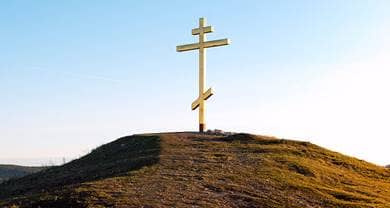- Trending:
- Pope Leo Xiv
- |
- Israel
- |
- Trump
- |
- Social Justice
- |
- Peace
- |
- Love

RELIGION LIBRARY
Eastern Orthodoxy
Suffering and the Problem of Evil
Eastern Orthodox Christians express the same range of beliefs about suffering and the problem of evil as the majority of other Christian traditions. The Eastern Orthodox tradition interprets the story of Adam and Eve in the characteristic Christian manner, as a story in which God's cherished creatures, Adam and Eve, disobeyed God's one command, thereby imposing their own will in place of God's. As a punishment, God expelled Adam and Eve from paradise, sending them into the world where they and their descendants would suffer pain, disease, and death. While some Christian traditions interpret this story literally, Eastern Orthodoxy interprets it symbolically, meaning that while it did not literally happen, it is full of religious truth. It describes the human condition, especially the presence of a barrier between God and humanity.
Eastern Orthodox belief shares the western idea of original sin. In the Orthodox view, all of creation, living and dead, visible and invisible, is holistically connected. What affects one creature affects all creatures. Therefore, the suffering and mortality imposed on Adam and Eve as punishment for their sin is shared by all of creation. However, the Orthodox tradition does not share the Augustinian idea of original guilt. While all of creation suffers the consequences of the first humans' sin, no other creature is guilty of that sin. All share, however, in the legacy of the fall from paradise. We all suffer disease and death, and we are all compelled by our own wills and desires, rather than God's. But we don't inherit Adam's guilt. So, for example, the Orthodox tradition does not teach that unbaptized infants will be sent to eternal fire and damnation.
Eastern Orthodoxy teaches that nothing is greater than God, including evil. Evil results from the free will of God's creation, and the evil one, Satan, was once good. His name was Lucifer, or light-bearer, and the Orthodox tradition likens him to the morning star. But he also opposed his own will to God's will, and found himself in darkness. Orthodoxy teaches that Satan is not as powerful as God. But Satan's particular talent is falsehood, so he is able to convince people that he is as powerful as God. Eastern Orthodoxy is very optimistic in its outlook, teaching that the triumph of good over evil on the Last Day is a certainty.
Eastern Orthodox Christians wonder why God would allow evil to exist in the first place, and conclude that this is a mystery. Their interpretation of the scriptures supports this conclusion. Still, Orthodoxy rejects quietism, believing that true love expresses itself in action. In the face of great suffering or evil, the Christian is called to help. Like Alyosha Karamazov in Dostoyevsky's novel The Brothers Karamazov, we do not wait for an explanation of great evil or a justification of God's plan. We are called to keep the commandments to love God and our neighbor. Evil is a practical problem for the Christian, who finds ways to alleviate suffering and reinforce God's love and goodness in the world.
Study Questions:
1. What is original sin? How does the Orthodox differentiation between original sin and original guilt differ from other Christian traditions?
2. Who is Lucifer? How does he relate to the problem of evil?
3. How and when can evil be overcome?










